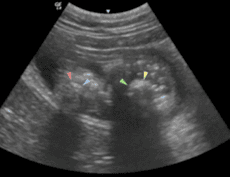Even pets are getting bored and into trouble when stuck at home! We would like to introduce you to little Nepal, a 3-year-old troublemaker Burmilla cat. He presented to his veterinarian on a quiet Sunday night in London during the Covid -19 lockdown. He had been vomiting and not acting like his normal cuddly self. On the advice of their primary care veterinarian, Nepal’s parents brought him into the emergency vets. London Vet Specialist and Vet 24 have remained open during the crisis to care for the most serious pet emergencies.
For the safety of veterinarians and pet owners we are limiting footfall in the hospital; veterinarians are working in shifts, owners are advised to wait outside the clinic, and protective gear is used when handling patients. This very cute, but naughty kitten must have eaten something out of boredom while the family has been isolating at home.
After the initial diagnosis, the emergency team provided Nepal with vital fluids, pain medications and took radiographs (x-rays) that were suspicious- it appeared that Nepal had eaten something that he shouldn’t have. He was referred for further care to the LVS team of specialists.
Our specialist in Diagnostic Imaging, Dr. Ian Jones rapidly arrived by bike to the hospital (due to the current restrictions half of our team work remotely to allow for social distancing).
An abdominal ultrasound was performed and revealed foreign material in his stomach and intestines causing a blockage. Plication, or corrugation of the intestines, was seen indicating material trying to pass unsuccessfully through his digestive tract. See the ultrasound images below:

Figure 1: Several hyperechoic structures (arrows) with associated acoustic shadowing (foreign material) within the stomach.

Figure 2: Plication of the small intestine (small arrows) associated with a linear, hyperechoic structure within the adjacent lumen (large arrows).
Our surgical team was also called in and ready for action. The goal of surgery was to remove the material causing the intestinal blockage. In the Figure 3 below we can see part of our team: Dr David Neilson, specialist in Anaesthesia and Analgesia, Dr Janet McClaran, soft tissue surgery specialist leading Nepal’s surgery and Dr Maite Pardo our surgical intern, providing assistance. Not even a pandemic will stop us providing the emergency care that your pets require.

Figure 3: In the operating theatre at LVS.
This surgery to remove the foreign material (in this case elastic shoelaces!) is called a gastrotomy-meaning a small incision (hole) is made into the stomach. Once everything is safely removed, the stomach can be stitched back together. Figure 4 on the left shows the plicated, or bunched intestines before the material was removed, and Figure 5 on the right after the material was removed and the stomach is being sutured back together. We have included a video of the material being removed from the stomach- click if you are not too squeamish.
According to Dr. Mcclaran, eating shoelaces, string or yarn is a very common thing for kittens and young cats to do. “It is very fortunate that Nepal’s parents brought him in to the veterinary hospital when they did-left untreated, this blockage of the intestinal tract could be very dangerous. While surgery has risks and complications, the prognosis for Nepal is excellent.”

Figure 4: Plicated (bunched) small intestines.

Figure 5: Suturing the stomach closed.
Nepal recovered really well from his procedure and in Figure 6 you can see all of the (yuck) material he somehow managed to munch on!

Figure 6: Elastic bands removed from the stomach.
Nepal made an amazingly rapid recovery in the company of the nurses, veterinarians and patient care assistants during his time in the hospital. Unfortunately, as no pet parents were allowed to enter the hospital for visits- lots of videos as photos, like the in Figure 7 below, were sent home to keep his family up to speed on his recuperation.

Figure 7: In the kitty recovery area following surgery.
Within just a few days of surgery, Nepal was resting comfortably (and quietly) at home. He has returned to sunbathing, but his parents are being very careful to make sure he doesn’t eat anything except cat food in the future. “Cat”astrophe averted.



